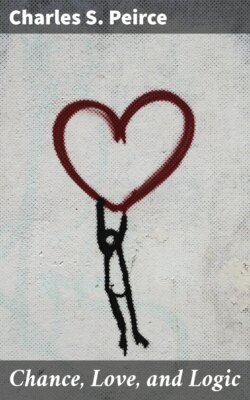Читать книгу Chance, Love, and Logic - Charles S. Peirce - Страница 6
На сайте Литреса книга снята с продажи.
II
ОглавлениеTable of Contents
This insistence on the continuity so effectually used as a heuristic principle in natural and mathematical science, distinguishes the pragmatism of Peirce from that of his follower James. Prof. Dewey has developed this point authoritatively in the supplementary essay; but in view of the general ignorance as to the sources of pragmatism which prevails in this incurious age, some remarks on the actual historical origin of pragmatism may be in order.
There can be little doubt that Peirce was led to the formulation of the principle of pragmatism through the influence of Chauncey Wright.[11] Wright who had first hand acquaintance with creative scientific work in mathematics, physics, and botany was led by the study of Mill and Bain to reflect on the characteristics of scientific method. This reflection led him to draw a distinction between the use of popular scientific material, by men like Spencer, to construct a myth or picture of the world, and the scientific use of laws by men like Newton as means for extending our knowledge of phenomena. Gravitation as a general fact had interested metaphysicians long before Newton. What made Newton’s contribution scientific was the formulation of a mathematical law which has enabled us to deduce all the then known facts of the solar system and to anticipate or predict many more facts the existence of which would not otherwise be even suspected, e.g., the existence of the planet Neptune. Wright insists, therefore, that the principles of modern mathematical and physical science are the means through which nature is discovered, that scientific laws are the finders rather than merely the summaries of factual truths. This conception of the experimental scientist as translating general propositions into prescriptions for attaining new experimental truths, is the starting point of Peirce’s pragmatism. The latter is embodied in the principle that the meaning of a concept is to be found in “all the conceivable experimental phenomena which the affirmation or denial of the concept could imply.”[12]
In the earlier statement of the pragmatic maxim,[13] Peirce emphasized the consequences for conduct that follow from the acceptance or rejection of an idea; but the stoical maxim that the end of man is action did not appeal to him as much at sixty as it did at thirty.[14] Naturally also Peirce could not follow the development of pragmatism by Wm. James who, like almost all modern psychologists, was a thorough nominalist and always emphasized particular sensible experience.[15] It seemed to Peirce that such emphasis on particular experiences endangered the principle of continuity which in the hands of men like Weierstrass had reformed modern mathematics. For this reason he began to call his own doctrine pragmaticism, a sufficiently unattractive name, he thought, to save it from kidnappers and from popularity. He never, however, abandoned the principle of pragmatism, that the meaning of an idea is clarified (because constituted) by its conceivable experimental consequences. Indeed, if we want to clarify the meaning of the idea of pragmatism, let us apply the pragmatic test to it. What will be the effect of accepting it? Obviously it will be to develop certain general ideas or habits of looking at things.
Peirce’s pragmatism has, therefore, a decidedly intellectual cast. The meaning of an idea or proposition is found not by an intuition of it but by working out its implications. It admits that thought does not constitute reality. Categories can have no concrete being without action or immediate feeling. But thought is none the less an essential ingredient of reality; thought is “the melody running through the succession of our sensations.” Pragmatism, according to Peirce, seeks to define the rational purport, not the sensuous quality. It is interested not in the effect of our practical occupations or desires on our ideas, but in the function of ideas as guides of action. Whether a man is to pay damages in a certain lawsuit may depend, in fact, on a term in the Aristotelian logic such as proximate cause.
It is of interest to observe that though Peirce is an ardent admirer of Darwin’s method, his scientific caution makes him refuse to apply the analogy of biologic natural selection to the realm of ideas, in the wholesale and uncritical manner that has lately become fashionable. Natural selection may well favor the triumph of views which directly influence biologic survival. But the pleasure of entertaining congenial illusions may overbalance the inconvenience resulting from their deceptive character. Thus rhetorical appeals may long prevail over scientific evidence.
